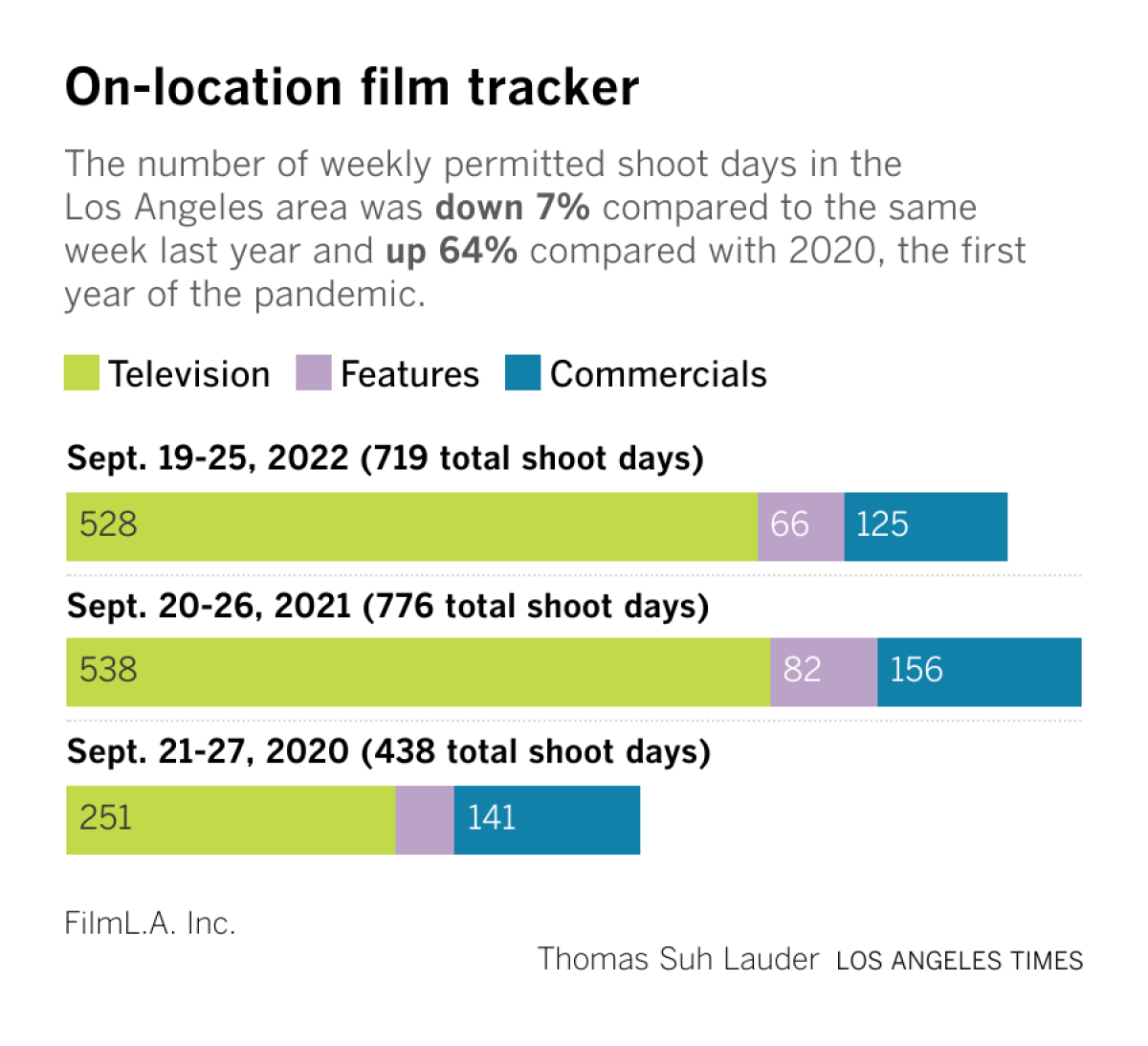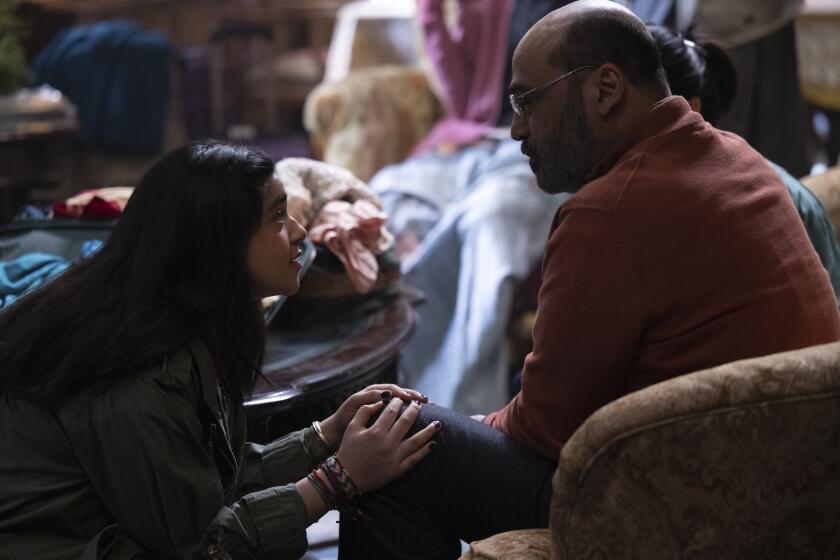Will people pay for a cheaper Netflix with ads?

- Share via
Welcome to the Wide Shot, a newsletter about the business of entertainment. Sign up here to get it in your inbox.
Times film business reporter Ryan Faughnder is on paternity leave and returns next week; Wendy Lee is filling in.
Only three years ago, Netflix brushed off advertisers hoping to market brands on the world’s largest subscription streaming platform, calling it “wishful thinking.”
But as Netflix’s stock declines and investors ramp up pressure for the company to continue to expand its customer base, ads on Netflix will soon become a reality.
Netflix has announced plans to launch a lower-priced advertising plan in early 2023 in certain markets and has hired two former Snap executives to helm its efforts.
Ads are selling for roughly $65 per thousand viewers and can be targeted to the streamer’s top 10 shows, a specific country or certain genres such as dramas, ad buyers told the Wall Street Journal. Netflix is aiming for four minutes of ads per hour, the Journal reported, citing information from ad buyers.
Netflix called the report “speculative.”
“We are still in the early days of deciding how to launch a lower-priced, ad-supported tier and no decisions have been made,” the streamer said in a statement.
Netflix’s foray into advertising represents a radical shift in its overall business model of selling subscriptions. Some skeptics view it as a sign of desperation that the once dominant streaming giant is losing market share to rivals such as HBO Max, Amazon and Disney+.
“Virtually everyone we talk to in Hollywood, outside of Netflix employees, is taking great pleasure in Netflix’s stock price collapse over the past nine months, as well as Netflix’s loss of religion around advertising (which many see as a desperate attempt to ‘save’ Netflix),” said a recent report by the New York-based research firm LightShed Partners.
Though a stunning departure, Netflix’s decision to embrace advertising in some ways was inevitable. HBO Max and Hulu offer their own lower-cost ad-supported plans. There’s also a growing number of free, ad-supported streaming services, including Amazon Freevee, Pluto TV, Tubi and the Roku Channel.
Free, ad-supported streaming TV services are growing fast and expected to command significantly more advertising dollars this year.
Whether Netflix can make enough money from ads to offset slowdowns in subscriber growth is anyone’s guess. But it’s clear that at least some consumers would welcome the shift.
Lower-cost Netflix subscriptions with ads could cause more people to stick with the streaming service if they are looking to save money.
Consumers are already interested in Netflix with ads, according to a recent survey of 2,500 U.S. adults by Samba TV and Harris X released Tuesday.
Of the adults surveyed, 45% of the Netflix users said they would switch to an ad-supported plan if it was half the price of their current subscriptions and if it offered five minutes or less of ads per hour, Samba TV said.
“Advertisers are not the only ones eagerly anticipating the rollout of Netflix’s new ad supported tier,” Samba TV Chief Executive and Co-Founder Ashwin Navin said in a statement. “There appears to be a strong appetite for an ad model from both current Netflix users, and more importantly from those who have either never had, or who have previously cancelled, a Netflix subscription.”
Netflix lost subscribers for the second quarter in a row, but the losses were not as bad as it had projected, thanks in part to ‘Stranger Things.’
Navin said that nine out of 10 adults who don’t have Netflix watch other ad-supported streaming content.
“These audiences have no aversion to watching ads in exchange for free or reduced price content and are prime candidates to turn to Netflix’s new ad-supported tier,” Navin said.
Netflix has not revealed how much it will charge for its new service. HBO Max and Hulu charge $9.99 and $6.99, respectively, for their monthly ad-supported plans. (Netflix’s ad-free subscription plans run from $9.99 to $19.99 a month.)
Some analysts agree that new ad-supported plans could boost customers numbers in international regions such as Latin America.
“It seems like there is more room to expand in those countries because they don’t have near the share of audience that they have in the U.S., so I think it’ll help there,” said Ross Benes, a senior analyst with market research company Insider Intelligence.
Stuff we wrote

— The Golden Globes awards show is coming back to NBC. The Hollywood Foreign Press Assn. touted the return of the broadcast after carrying out a series of reforms following an L.A. Times investigation led by my co-workers Stacy Perman and Josh Rottenberg.
— As more shows like soap opera “Days of Lives” move to streaming, not everyone is happy. TV reporter Meredith Blake tracks how the practice is alienating older soap fans. Streaming is also offering opportunities to once shunned stars like Roseanne Barr, who will have her first stand-up special in 16 years on Fox Nation, Stephen Battaglio reports.
— Anousha Sakoui writes that the family of 29-year-old cinematographer Peng Wang, who died on a USC student film shoot, filed a wrongful death lawsuit against USC and two students. In June, Wang’s father told Sakoui, “In life, there is no greater pain than this type of bereavement.”
— Sakoui also covered the latest developments on the “Rust” tragedy. The DA’s office in New Mexico confirmed that criminal charges could be coming against four people, including actor Alec Baldwin, in the shooting death of cinematographer Halyna Hutchins.
— Please welcome tech reporter Brian Contreras to the Company Town team. This week, Brian wrote about YouTube offering ad-revenue sharing for creators making short-form videos. It’s a necessary move for YouTube as it competes against TikTok.
— KTLA anchor Mark Mester made on-air remarks criticizing the way Lynette Romero’s exit was handled. Then, he was fired. Jonah Valdez has the scoop. Meg James addresses the turmoil inside KTLA and criticism that station executives have been insensitive to concerns about a shortage of Latinos on air.
— L.A.-based video and live events business Triller settled a lawsuit with music producers Swizz Beatz and Timbaland.
— Meg James writes about the back story behind Hulu’s “Legacy: The True Story of the LA Lakers.”
Number of the week

Thirteen million viewers watched the Sept. 15 Thursday Night Football game on Amazon Prime Video, according to Nielsen. Stephen Battaglio reports that viewership is up 47% from a comparable game last year. Amazon paid $1 billion annually for 15 Thursday night games, and so far, many younger viewers are watching, Battaglio writes. Amazon, whose data counted the alternative streams of the game on Prime Video, says an average of 15.3 million viewers tuned into the Sept. 15 game.
Catch-up reading...
— Sarah Krouse and Jessica Toonkel report that Netflix is reducing its costs by changing how it pays for comedy specials (Wall Street Journal).
—Emily Baker-White reports that three former TikTok department heads quit because they were told to follow guidance from the China office of parent company ByteDance (Forbes).
—Cynthia Littleton details how TV executive Charlie Collier’s move to Roku plays into the company’s strategy (Variety).
—Alex Sherman writes about Creative Artists Agency Co-Chairman Bryan Lourd’s influence on Hollywood (CNBC). I interviewed Lourd earlier this month about his efforts to help prepare the next generation of students interested in working in Hollywood.
Films shoots
On location film shoots in the Los Angeles area dipped 7% last week compared to the same period a year ago. Here are the latest numbers:

Finally ...

I recently completed the Disney+ series “Ms. Marvel” about Kamala Khan, a young Pakistani American teenager who discovers she has superpowers.
As someone who did not grow up seeing female superheroes of color on TV, it was awesome and inspiring to witness Khan fight evil and deal with the challenges of having protective parents who are first generation immigrants. Khan also uncovers more of her past, delving into what happened to her great-grandmother during the Partition.
TV critic Lorraine Ali and staff writer Tracy Brown discuss the Disney+ series’ many representational milestones and what it all means for Marvel.
Two of the directors who worked on “Ms. Marvel,” Adil El Arbi and Bilall Fallah, were also the directors of HBO Max’s “Batgirl” featuring the first Afro-Latina Batgirl, making me wish I could see that film. For now, Warner Bros. Discovery, which runs HBO Max, has stopped the movie from being released and could use it for a tax write-off.
Inside the business of entertainment
The Wide Shot brings you news, analysis and insights on everything from streaming wars to production — and what it all means for the future.
You may occasionally receive promotional content from the Los Angeles Times.







